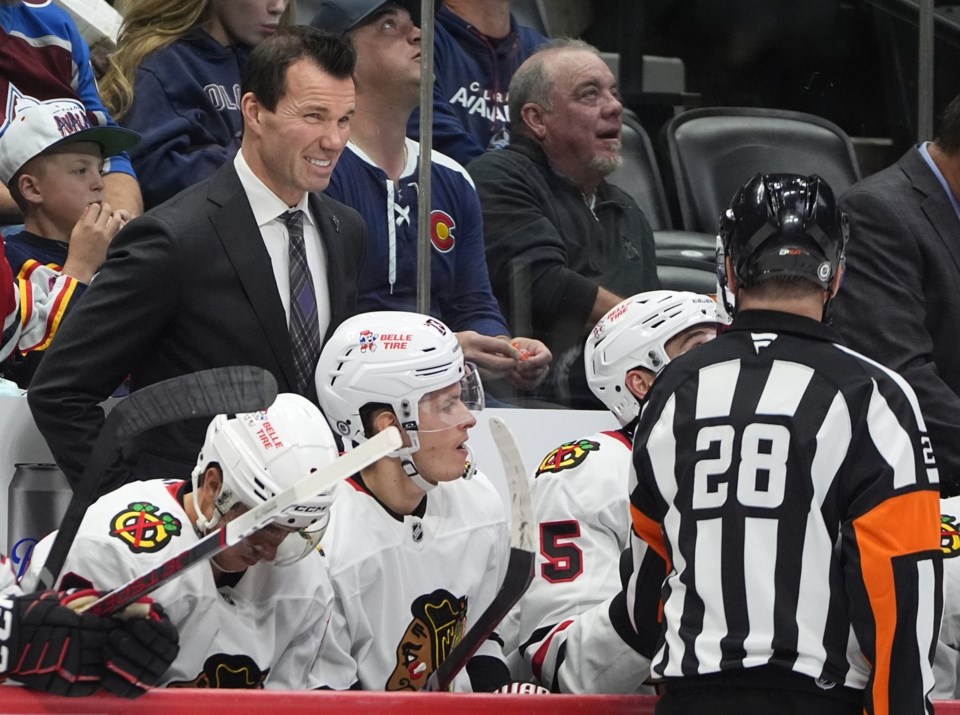Morgan Rielly was working his way back from injury.
The Toronto Maple Leafs defenceman found himself in the bowels of Scotiabank Arena one evening as his teammates battled in front of a packed house. The club's video coaches were down the hall in a nearby office, pouring over every detail on their screens.
Rielly couldn't look away.
"Important moments," he said. "I know that they feel the stress of it."
Video has become an integral part of the sporting landscape — for teams and fans alike. Once an afterthought, tape is spliced, diced and picked apart to get the best angle when there's a controversial call. Decisions have to be made almost immediately.
In the NHL, an assistant coach equipped with a headset and microphone is in constant communication with a club's video department to discuss any potential challenges to officials' on-ice decisions.
"Some of the most important people in the room," New York Rangers head coach Peter Laviolette said of his eyes in the sky. "They're excellent at what they do. They watch more hockey and they put more time in … it's amazing how good they are.
"A strength of the coaching staff."
NHL coaches have been able to challenge offsides, game stoppage calls and goaltender interference on plays leading to goals against for a number of years. It can mean the difference between winning and losing. Getting a challenge wrong, however, results in a two-minute penalty — a disadvantage that can mean the same.
The league expanded the system this season to include penalties for delay of game, allowing teams to challenge if a puck struck something or someone before going directly out of play.
The head coach makes the final decision on a challenge — there are monitors on the bench — but making the wrong one using information from the video room in that scenario would gift the opposition a 5-on-3 power play for a full two minutes.
The stakes, in short, are very high.
"They've got to be on their toes every single game, every single shift, every single moment," New York Islanders centre Bo Horvat said. "If they miss something, it's on them."
Seattle Kraken defenceman Brandon Montour, who signed in free agency from the Stanley Cup-winning Florida Panthers, said the video coaches were a big part of the team's championship run.
"We'd go back and fire them up," he said. "They're in their office behind the scenes, but they're a big, big part of what we do."
Added Utah Hockey Club captain Clayton Keller: "Those guys are heroes in a lot of games."
Philadelphia Flyers forward Owen Tippett said preparation helps them make those split-second decisions.
"They're always going over stuff," he said. "Watching other calls … what got called back and what (didn't)."
Video is also a massive teaching tool in an age where athletes crave information.
"They're getting bombarded," Vancouver Canucks head coach Rick Tocchet said of his staff. "Guys really want to know what's going on, how to be ready for the next day."
The former NHLer has seen a drastic shift in how video coaches are utilized.
"They have to know your system," Tocchet added. "Back in the day, you'd just tell them to cut something."
Rielly said watching the video process up close altered his perspective on what's often been an afterthought.
"They probably have the best understanding of the rules of anyone," he said. "They don't take it lightly. It's not something that you swing and you hope you hit.
"It's pretty calculated."
UNFAMILIAR FACES
The NHL scoring race has been dominated by three players over the last eight years — Edmonton captain Connor McDavid has won the Art Ross Trophy five times, Tampa Bay Lightning playmaker Nikita Kucherov owns two, and Edmonton centre Leon Draisaitl has one.
Two months into the 2024-25 season, there are some unfamiliar names atop the ledger.
Heading into Wednesday's play, Minnesota Wild winger Kirill Kaprizov and Carolina Hurricanes centre Martin Necas were tied for the league lead alongside Colorado Avalanche star and reigning Hart Trophy winner Nathan MacKinnon with 39 points.
BUMPY ROAD
Chicago Blackhawks star Connor Bedard — the top pick at the 2023 draft and last season's Calder Trophy winner as rookie of the year — recently went 12 straight games without scoring.
The 19-year-old centre had five goals and 19 points in 25 games this season heading into Wednesday after putting up 61 points (22 goals, 39 assists) in 68 contests in 2023-24. Chicago head coach Luke Richardson said Bedard's uneven journey is all part of the process for a young player.
"Keep things simple when things aren't going 100-per-cent right," he said of his message to the player. "Sometimes guys want to go to step 10 instead of step one, two, three, four.
"He's shooting the puck more, moving his feet a little quicker — instead of thinking and looking for that perfect play."
-With files from Gemma Karstens-Smith in Vancouver.
This report by The Canadian Press was first published Dec. 4, 2025.
___
Follow @JClipperton_CP on X.
Joshua Clipperton's weekly NHL notebook is published every Wednesday.
Joshua Clipperton, The Canadian Press

